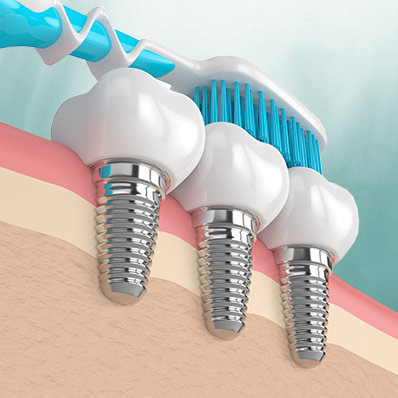
What to Know About Cleaning All-on-Four Dental Implants (Removable or Nonremovable)
Dental implants are an investment you want to maintain. Cleaning all-on-four dental implants, whether permanently mounted or snap-on, is a combination of two protocols: 1) what you do at home and 2) what your dentist does during scheduled cleaning visits.
What Are All-on-Four Dental Implants?
Before we get into cleaning regimens, let’s briefly go over what you can expect if you opt for all-on-four implants. Essentially the “all-on-four” denotes four denture implants that supports an entire upper or lower (or both) full denture. Candidates for all-on-four teeth replacement typically must undergo complete tooth replacement through implant surgery.
Before the surgery session, however, you could require some bone restoration so that the implants can be seated in a firm foundation. It’s a painless bone-grafting process. On the day of surgery, plan to spend much of the day in the implant center. The surgical procedure, while radical, is painless. After strong sedation, you will awaken with newly grafted implant posts, ready for your temporary dentures.
Read more about the surgical procedure, including bone grafting, in this Mayo Clinic article on dental implant surgery.
Cleaning All-on-Four Dentures
As with your natural teeth, cleaning your dentures is crucial to keeping them looking white and fresh in a healthy mouth, while at the same time preventing plaque buildup and inflammation at the implant site.
Cleaning Screw-Attached (Nonremovable) Dentures
You’ll need the following dental tools for best home maintenance of your dentures:
- An electric toothbrush. This is a wise investment because it is five times more effective in cleaning than a manual brush. Remember to use a nonabrasive toothpaste to protect the acrylic teeth on your dentures.
- A water pick. Fill the tank with ¼ mouth rinse and ¾ water. Use it after every meal to remove food debris.
- Super floss. Super floss (by Oral-B, for example) is ideal for cleaning the space between the gums and the denture. It comes with a plastic dental floss threader and both spongy and regular floss.
- A proxy brush. This is a small round toothbrush whose bristles can reach under the bridge more efficiently than a full-sized brush.
- Soft picks (commonly called “doctor’s toothpick”). These are very slim and can reach difficult crevices beneath the spaces between the dentures and the gumline.
- An end tuft brush. This is a small toothbrush that can clean the surface of the intersection of the denture and the gum crevice.
- A rubber tip. This is useful for removing (i.e., by polishing) plaque from the denture surface under and around the denture.
Caring for Snap-in Dentures
Before snapping the dentures into place each morning, brush your gums, tongue and the roof of your mouth with a soft bristled brush. Rinse your dentures well before brushing to remove any loose food and debris.
Again, a soft-bristled toothbrush with a nonabrasive cleaner will remove food particles. As with regular dentures, your snap-in dentures should be stored in water until used again. Check with your dentist or hygienist for any special instructions on cleaning and storing your snap-in dentures.
For Both Types of Implant Dentures, Do the Following:
When cleaning your dentures, dip your cleaning aids in mouthwash. Brush the top of your tongue as well as your dentures. Your tongue is a breeding place for bacteria that can spread throughout your mouth. After brushing and flossing (at least twice a day) rinse with an alcohol-free mouth wash like Natural Dentist.
Visit the Dentist Every Three Months
A quarterly visit for routine maintenance and cleaning of your implants and dentures is a must. The visit can be as routine as scaling and cleaning or as thorough as removing the permanently attached dentures for a deep cleaning of the implant roots, depending on plaque buildup.
“What I like most about my job is that we help our patients leave with a great smile and the results that they want.”
– Yesenia Macedo

Two Types of Dental Implant Denture Mounts
Screw-Attached Dentures Are Not Removable
All-on-four surgery is the minimum requirement to attach screw-affixed dentures to the implants. The titanium-reinforced dentures were meticulously crafted by the orthodontist in a long session before the surgery.
The permanent implant, which can only be removed by a dentist or qualified technician, is durable and can last for many years. Permanent implanted dentures, are, however, more expensive than snap-on implants.
Snap-on Implants Are Removable But Less Durable
At a lower cost than screw implants, snap-on implants — commonly called overdentures – are a step up from traditional dentures. If you opt for the snap-on version, you could lower the overall cost and get by with just two implants. On the other hand, snap-on implanted dentures have two disadvantages:
1. They are not as strong as permanent all-on-four implants. The denture rests primarily on the gum line. It doesn’t have the strong implant foundation of the all-on-four implants, and does not provide the biting force of the permanently anchored dentures.
2. They don’t last as long. Maintenance is also an issue. Wear and tear on the attachment surface because of repeated snapping in and out of the denture means you’ll need to replace the denture every 12 to 18 months. Over time, snap-in dentures break down and become loose.
So, are all on four dental implants removable? The answer is, yes, if they are the snap-on variety – and no they are not, if they are screwed into the implants.
Are Dental Implants Right for You?
Whether you need periodontal care to treat gingivitis or you have lost or missing teeth and are in need of implant surgery in the greater Lake Jackson area, contact Coastal Periodontics. We have a full range of dental services that can restore your smile and self-confidence.
Chew Without Pain. Get a Beautiful Smile.
Dental implants can change your life. Explore your options for dental implants with Coastal Periodontics’ state-of-the-art technology.
New Patient Special: Support the Charity of Your Choice
Get a complete exam, X-rays and 3D CT scan all for $250. We’ll create a personalized care plan for the treatment that is best for you, whether the revolutionary Pinhole Technique for gum recession, laser assisted treatment for gum disease, and a variety of implant procedures to replace missing teeth or support dentures. Plus, you’re supporting your community – we’ll donate a portion of your fee goes to the charity of your choice.
